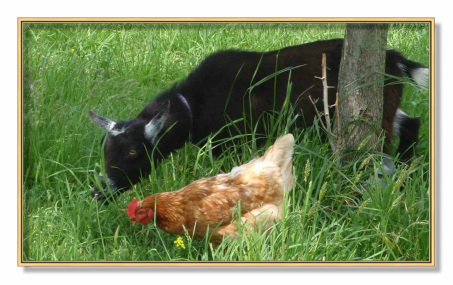We strongly believe that the basis of good herd management is excellent nutrition. Fresh clean well water, free choice loose Manna Pro goat minerals, and sodium bicarb are always available. Our goats love to graze and browse daily throughout the farm pastures.
Goats and sheep are fed our own organic grass hay when needed in bad weather and over the winter. Milking does are fed Blue Seal Dairy Goat Pellets with a topping of BOSS and Sunshine Pellets. Our bucks are fed Blue Seal grain with ammonium chloride. All goats receive injectable Zinc, Manganese, Copper and Selenium |
on a quarterly basis. Hooves are trimmed approximately every 6-8 weeks, and worming is done every three months as needed. We immunize with CDT yearly. We test yearly for CAE and Johnes, and do an annual exam for CL.
Kids are dam raised but handled daily. Most take a supplementary bottle from a young age which produces friendly loving young goats. Below is our guide to basic care for those unfamiliar with goats.
Kids are dam raised but handled daily. Most take a supplementary bottle from a young age which produces friendly loving young goats. Below is our guide to basic care for those unfamiliar with goats.
